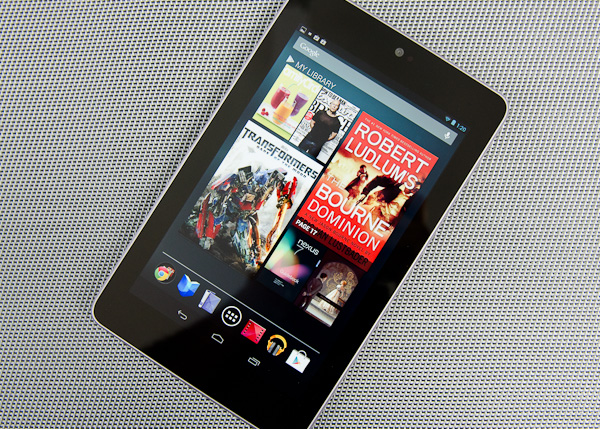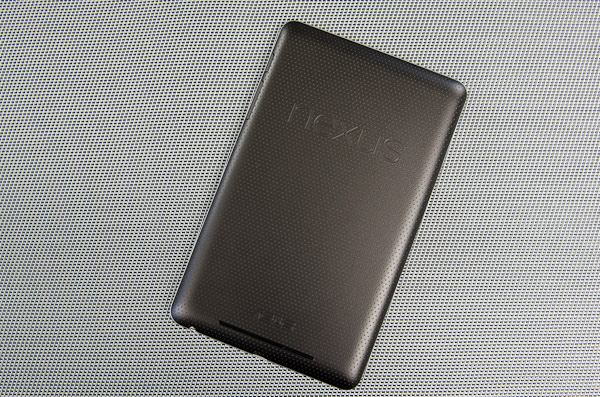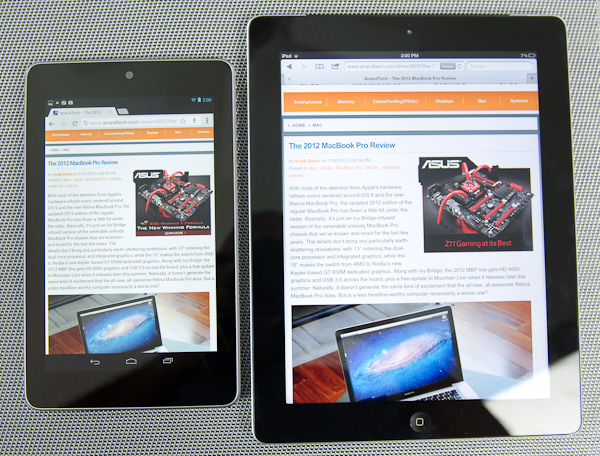The Google Nexus 7 Review
by Anand Lal Shimpi & Brian Klug on July 26, 2012 11:35 AM ESTI viewed Google I/O, Jelly Bean (Android 4.1) and the first Nexus tablet as Google's last chance to deliver a knockout in the tablet space before the onslaught of Windows 8 and Windows RT devices later this year. While the show was undoubtedly a success, I don't know that the market for $499+ Android tablets has a life after Windows 8/RT hit. We should see Windows RT tablets at $499, and Ivy/Haswell based Windows 8 tablets will handle the higher price points.
It seems that Google also realized this as the Nexus 7, its first Nexus branded tablet, starts at just $199. There's a huge market for tablets as a primary computing device, and I believe Windows RT/8 offers something unique and compelling for that usage model. At the same time however, there's decent demand for a tablet to augment your existing computing world. It's a far more specific usage model but one that really demands a lower price point. Users are willing to spend a lot for something that does everything in your life, but for something that's more nice than necessity, price matters even more.
The Nexus 7 is aimed at the latter. It's a device for users who need ultra portability and tons of battery life for content consumption. While Apple has been quietly empowering the iPad to be a content creation device, and dockable Windows 8/RT tablets will attempt to replace your notebook, the Nexus 7 is a more traditional ARM based tablet by default.
It's clearly Google that I have to thank because the Nexus 7 is the most solidly built ASUS tablet I've ever used. That's not to say that its predecessors were examples of shoddy workmanship, it's just that the Nexus 7 is damn near perfect. The back has a great grip to it. The whole thing actually feels like a well made book because of the soft touch plastic back. The book comparison is sort of hilarious because it's a feel that Amazon couldn't get right with its overly generic Kindle Fire. The book illusion stops once your hands touch the glass for obvious reasons, but man does it feel nice to hold.
The Nexus 7 feels considerably lighter than the Kindle Fire, but I still had to prop it up on something or hold it in two hands if I was going to use it for a long period of time.
The power button and volume rocker are placed much like they would be on a phone - at the top right edge of the device. The sole buttons on the device do feel a bit ambiguous, something I feel that I would get used to over time. I had the disadvantage of switching between several tablets during this review and never did get used to the position and feel of the buttons on the N7. That's probably the biggest gripe I have about the design of the device. In other words, there's not much to hate.
The Nexus 7 features two mics for noise canceling action (likely in support of Google Now). You get NFC, Bluetooth and 802.11n WiFi but there's no LTE option as of now. I know there's internal debate about releasing an LTE enabled version at some point in the future.
| ASUS Tablet Specification Comparison | ||||||
| ASUS Transformer Pad Infinity | ASUS Transformer Pad 300 Series | ASUS Eee Pad Transformer Prime | ASUS Nexus 7 | |||
| Dimensions | 263 x 180.6 x 8.4mm | 263 x 180.8 x 9.9mm | 263 x 180.8 x 8.3mm | 198.5 x 120 x 10.45mm | ||
| Chassis | Aluminum + Plastic RF Strip | Plastic | Aluminum | Plastic + Rubber back | ||
| Display | 10.1-inch 1920 x 1200 Super IPS+ | 10.1-inch 1280 x 800 IPS | 10.1-inch 1280 x 800 Super IPS+ | 7" 1280 x 800 IPS | ||
| Weight | 594g | 635g | 586g | 340 g | ||
| Processor |
1.6GHz NVIDIA Tegra 3 (T33 - 4 x Cortex A9) |
NVIDIA Tegra 3 (T30L - 4 x Cortex A9) |
1.3GHz NVIDIA Tegra 3 (T30 - 4 x Cortex A9) | 1.3 GHz NVIDIA Tegra 3 (T30L - 4 x Cortex A9) | ||
| Memory | 1GB DDR3-1600 | 1GB | 1GB | 1 GB | ||
| Storage | 32/64GB + microSD slot | 16GB/32GB + microSD slot | 32GB/64GB + microSD slot | 8 GB / 16 GB | ||
| Battery | 25Whr | 22Whr | 25Whr | 16 Whr | ||
| Pricing | $499/$599 | $379/$399 | $499/$599 | $199/$249 | ||
Cost is the major selling point for the Nexus 7: for $199 Google will sell you an 8GB version with a $25 credit at the Google Play store, along with some preloaded magazines, books and a movie (Transformers: Dark of the Moon). It's tough to buy a new tablet and not buy apps for it, so the $25 credit is likely to be incredibly useful - making the effective retail price of the Nexus 7 $174. If you want 16GB of storage the price does go up to $249 however. Unfortunately even Google is not above charging $50 for $4 of MLC NAND.
The limited NAND capacity prevents the Nexus 7 from being home to more than a single full length movie or a couple of TV shows. Streaming video content isn't a problem, Netflix works beautifully on the device but there's no hope if you want to keep a ton of content local. Unfortunately USB OTG isn't supported for storage, so you're left with no other option for expanding local storage (short of rooting the device).
In every sense outside of portability, a 10-inch display is much nicer to look at than a 7-inch one in my opinion. There's less zooming in you need to do on web pages or magazines. Text in general is just easier to read and perhaps I'm getting too old, but there's something nice about everything being comfortably bigger.
Does the Nexus 7's form factor make it feel substantially better than using a smartphone? Yes, I'd say so. The same reasons I gave above for a 10-inch tablet being nicer to use than a 7-inch tablet are equally applicable to 7-inch tablet vs. a smartphone. There's this size/usability optimization curve that requires some soul searching to figure out exactly where you land on it. I suspect most people fall into the small smartphone + large tablet dichotomy, but the beauty of this current mobile revolution is the availability of choice. The Nexus 7 in many ways is very much like the 11-inch MacBook Air. A bit impractical for many, but those who crave portability are drawn to it. The Nexus 7 still feels like you're using a tablet, just a small one.
I needn't dwell on the benefits of a 7-inch form factor for portability any longer. If I'm wearing baggy enough pants I can even pocket the Nexus 7, something I simply couldn't do with the iPad. I'm more likely to carry the Nexus 7 with me than I would the iPad, but the comparison isn't quite as open and shut as that. The iPad offers LTE, the Nexus 7 is more portable, the iPad is easier to look at, the Nexus 7 is more affordable...the back and forth is endless.



















118 Comments
View All Comments
Sined - Thursday, July 26, 2012 - link
Hey Anand, great review as usual.I want to point out something about the lack of an SDcard slot.
Dan Morrill from Google Android team explained on Reddit why Google is moving away from SDCard storage on Nexus Devices.
It's a really interesting read on the reasons why.
http://www.androidpolice.com/2011/11/18/impromptu-...
Lucian Armasu - Thursday, July 26, 2012 - link
You keep putting Windows RT together with Windows 8, as if they are the same thing and will be just as successful (or will fail just as much). But in what way is a Windows RT tablet, especially one that is twice as expensive, or at least as expensive as an iPad, better than an Android tablet? Is there an advantage at all that they hold over Android tablets? Because I see none, and I'm not sure why you keep up-playing Windows RT while downplaying Android tablet throughout your article.antef - Thursday, July 26, 2012 - link
Agreed....a hybrid x86 Win8 device might appeal to some people, but a WinRT ARM tablet is not inherently better than Android. I would actually argue Android is better because its app ecosystem is more mature and all the Google services apps are a given. Metro is completely unproven.WinRT will have the limited desktop with a simplified set of Office apps, that's it. I don't care about that at all, along with many other people I'm sure.
Impulses - Friday, July 27, 2012 - link
Office RT is the only clear advantage out of the gate, if they actually provide a featured desktop conversion that just happens to run on ARM... If all they put out is a Metro stepchild then that goes out the window. (no pun intended) It's a big selling point tho, but only if Win RT tablets are price competitive with iPads and Android tablets.Personally I'm still not sold on this holy grail of device convergence either way. 12" or smaller laptops are too cramped for serious work, and tablets just aren't as comfortable for use around the house at that size either. 7" or 8.9" is ideal IMO, specially as an addition to a 13"-14" laptop which is probably the most common scenario.
I say that despite having enjoyed using a 10" ASUS Transformer for over a year now. Currently I have that and a 3 year old netbook and I'm really yearning for a larger laptop replacement for the latter and a smaller tablet in the long run (the TF + dock has been a nice replacement for the netbook when traveling without work duties tho).
EnzoFX - Thursday, July 26, 2012 - link
Why will Win8 Tablets cannibalize Android tablets?I'm all for more competition, and MS is definitely bringing it, but are you implying it'll overtake Android right away? MS has a long way to go before that. Even their specs seems underpar, except for the intel powered one, which comes in at ultrabook pricing...
Impulses - Friday, July 27, 2012 - link
If that... I seriously don't see how Intel powered tablet hybrids will come in at ultrabook pricing all the while sporting better displays and near identical hardware all around (with a more complex builds). Something's gotta give, or the build quality of ultrabooks has inflated prices a ton...TareX - Friday, August 3, 2012 - link
Windows 8 RT is DOA. No apps, no way to compete, and it's too late in the game to start a new third party base. Windows 8 pro tablets are GREAT, except that they won't be price anywhere close to being competitive, so those are kind of DOA too in a different way. Very few people would pay $800-1000 for a tablet.Death666Angel - Thursday, July 26, 2012 - link
Thanks for the video review, I started missing them already! :DIf the Nexus had an SD slot and more storage out of the box without a 50USD increase in cost, I'd probably already have one. As it stands now, I'm content with my Chinese tablet (Cube U30GT). It has issues, but for the price (260€) it is pretty great. And I'm 100% with you, paying too much for tablets right now is not a smart move, considering the rapidity of the hardware development.
TareX - Friday, August 3, 2012 - link
You do realize this pricing is actually super generous on Google's behalf (they're selling it at a loss), yet you want them to include a MicroSD, and have more storage without the $50 bump. I'm all for a MicroSD but you're getting a wee bit too greedy here. There's a reason it's out of stock almost everywhere.Mr. Context - Thursday, July 26, 2012 - link
Hey, I think the biggest differences between the devices is in their aspect ratio and he HDMI output. Please check this link to hear my 50 cents on it... http://bit.ly/OezNK7